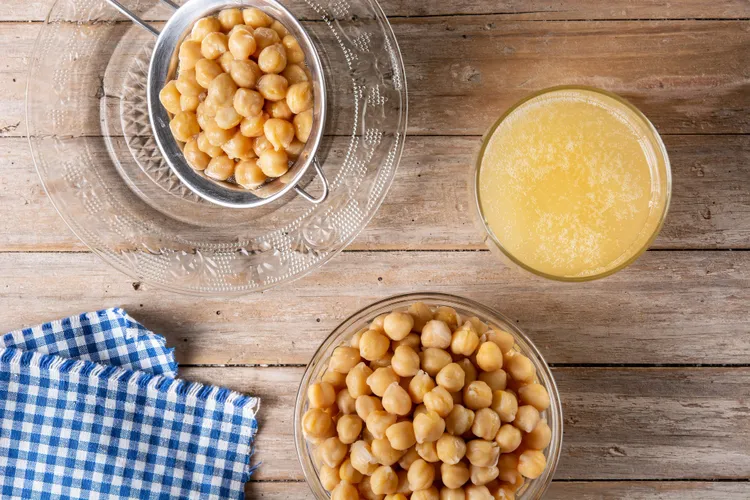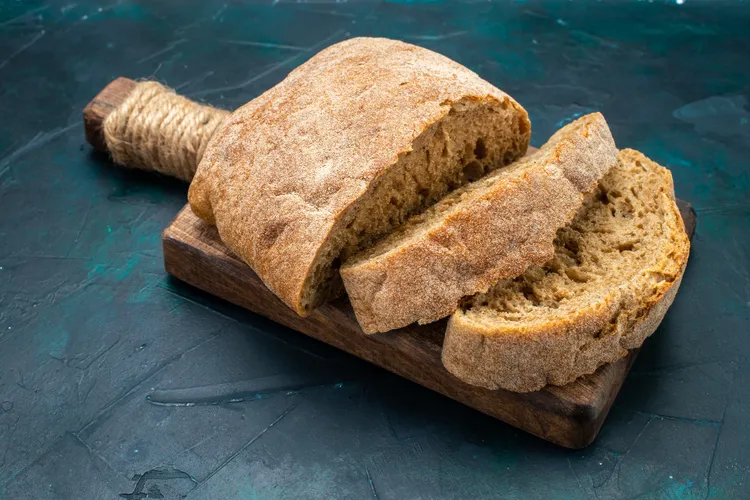Plant-Based Post-Workout Meals That Actually Work
Whether you’re vegan, vegetarian, or just cutting back on animal products, plant-based recovery meals can give your body all the nutrients it needs - and more. The secret? Combining whole foods like quinoa, beans, lentils, tofu, and veggies for a complete amino acid profile, rich in fiber, vitamins, and antioxidants.
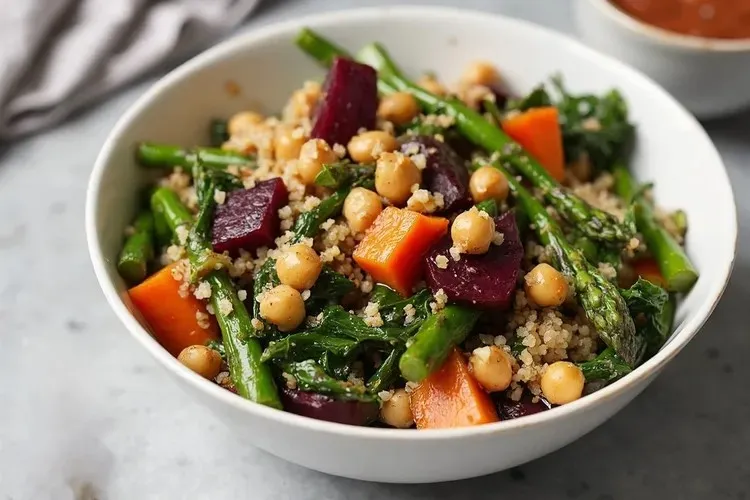
Refuel Without Meat - and Feel Amazing
So, you’ve finished your workout - your heart’s pumping, your energy’s buzzing, and you’re ready to refuel. But here’s the thing: you don’t need meat to build muscle or recover effectively.
We are sharing plant-based recipes that are simple, balanced, and scientifically backed to help your muscles rebuild, reduce inflammation, and keep you energized - all while tasting incredible.
Key Takeaways: Plant-Based Recovery Meals
Why they matter:
Plant-based recovery meals provide clean protein, slow-digesting carbs, and anti-inflammatory nutrients for effective muscle repair.
What you’ll find here:
Vegan and vegetarian meals that naturally boost muscle recovery and energy.
Nutrition focus:
-
Complete plant proteins (quinoa, lentils, beans, tofu)
-
Fiber for digestion and sustained energy
-
Antioxidants to reduce inflammation
When to eat: Within 2 hours post-workout, after a protein-rich smoothie or light snack.
Add vitamin C-rich foods like bell peppers or lime juice to boost iron absorption from plant proteins.
Why Plant-Based Meals Support Recovery So Well
Many people think you need meat to repair muscles - but that’s a myth.
Plant-based meals can be just as powerful, provided they include enough protein and a variety of amino acids.
Whole foods like lentils, quinoa, tofu, and beans not only rebuild muscle but also offer:
-
Antioxidants that soothe post-exercise inflammation
-
Electrolytes & minerals like magnesium and potassium for hydration
-
Phytonutrients that support hormone balance and energy production
Plant-Based Recovery Meals
These recipes are simple, nourishing, and perfectly balanced for post-workout recovery.
Roasted veggie bowl with creamy tahini dressing
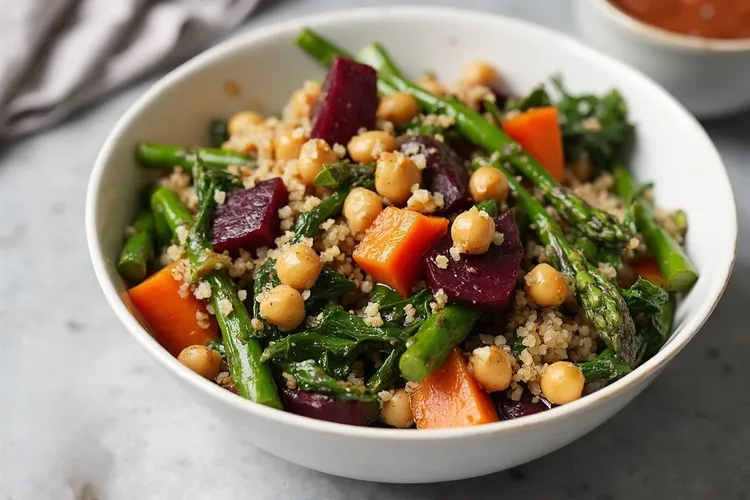
Why it works: This vibrant salad is the perfect post-workout all-rounder - combining complex carbs, complete protein, and healthy fats in one bowl. Quinoa provides all nine essential amino acids for muscle repair, while roasted vegetables add fiber, antioxidants, and natural electrolytes like potassium and magnesium. The creamy tahini dressing offers calcium, iron, and healthy fats that support joint and bone recovery.
Nutritionist’s Tip: Roast extra veggies ahead of time and keep a jar of tahini dressing in the fridge - that way you can assemble this meal in minutes. For an added boost, top it with hemp seeds or toasted almonds to bump up protein and texture.
Tofu scramble
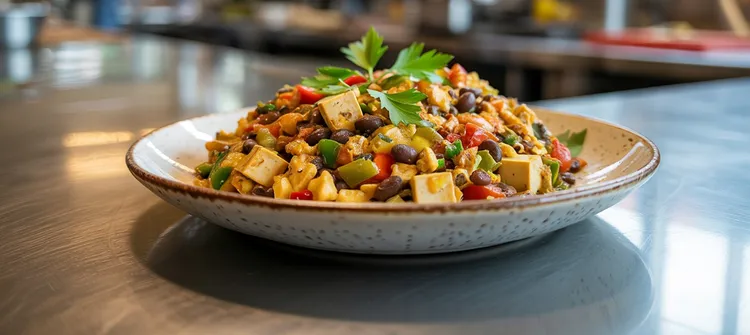
Why it works: If you’re looking for a light, easy, and protein-rich post-workout meal, this tofu scramble is a winner.
Tofu provides complete plant protein, containing all nine essential amino acids your muscles need for repair and growth. The combination of tofu and sautéed vegetables offers vitamins, fiber, and antioxidants that support digestion and reduce inflammation - ideal after exercise.
Tips: Add a tablespoon of hemp seeds or pumpkin seeds for extra protein, magnesium, and omega-3 fats. Mix in nutritional yeast for a subtle cheesy flavor and added B-vitamins. Serve with a side of avocado slices for healthy fats and potassium.
Warm Lentil & Sweet Potato Salad
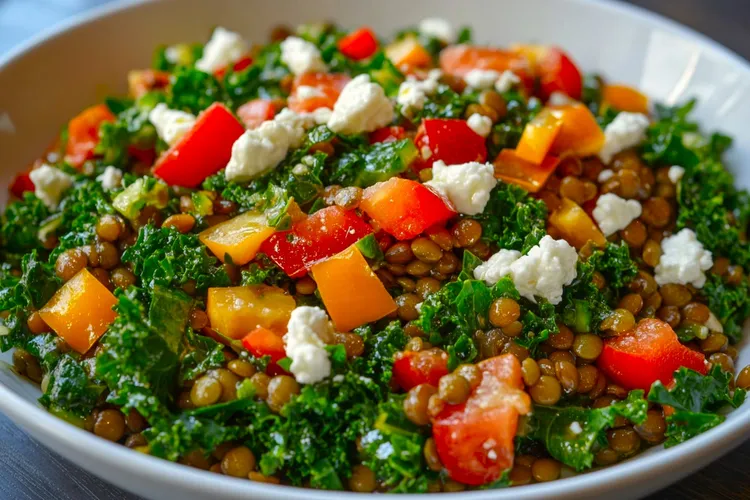
Why it works: Lentils offer strong plant protein, sweet potatoes add carb support for glycogen restoration, leafy greens supply antioxidants and micronutrients for muscle recovery.
Tip: Add pumpkin seeds or hemp seeds for extra magnesium and healthy fats.
Roasted Leek, Arugula & Sweet Potato Salad
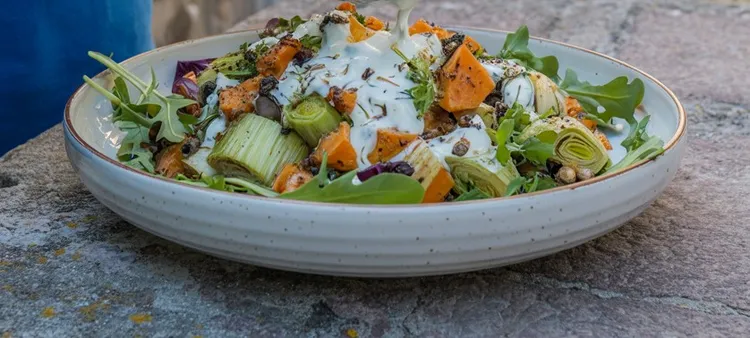
Why it works: Sweet potato again gives carb fuel, arugula and leeks bring micronutrients and antioxidants, Greek yogurt-mustard dressing adds a bit of creamy texture and some protein.
Tip: Swap the yogurt for a plant-based yogurt to keep it fully vegan, and add chickpeas for added protein.
Sweet Potato Falafels with Tomato Salad
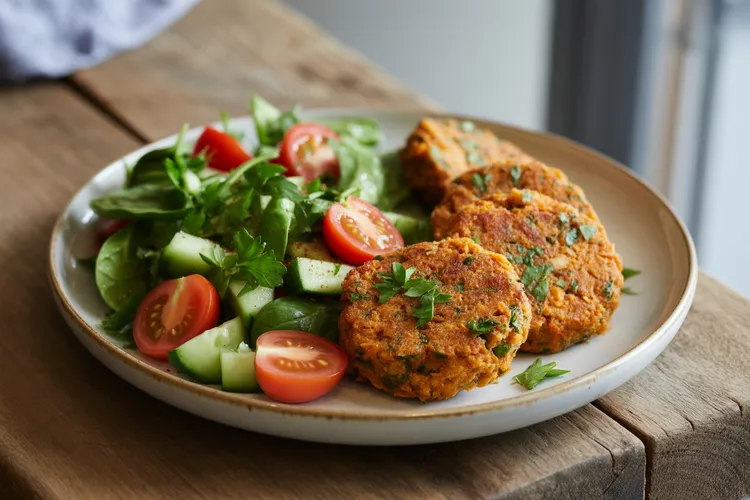
Why it works: Falafels made with sweet potato and chickpeas combine carbs + protein in one handy dish; the tomato salad brings fresh vitamins and hydration for recovery.
Tip: Serve with a side of whole-grain pita or quinoa to increase carbohydrate load if your workout was intense.
Lentil & Sweet Potato Coconut Curry
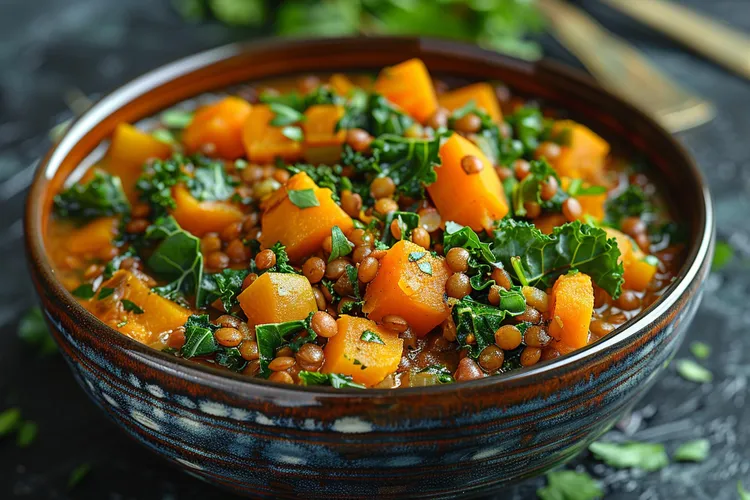
A vegan, gluten-free curry combining lentils (protein + fibre) with sweet potato (slow-digesting carbs), kale and coconut milk.
Why it works: Perfect post-workout because it replenishes glycogen (sweet potato), repairs muscle (lentils), and supports recovery with anti-inflammatory ingredients like turmeric and kale.
Tip: Serve over brown rice or quinoa for extra carbs if your workout was intense.
How to Build Your Own Plant-Based Recovery Meal
You don’t always need a recipe - once you understand the basic structure of a balanced post-workout plate, you can build recovery meals that fit your mood and pantry staples.
Here’s a simple, nutritionist-approved formula you can follow every time:
Start with your protein base.
Think lentils, tofu, chickpeas, edamame, or quinoa - foods that give you around 20-30 grams of protein per serving. These will help repair muscle tissue and promote lean muscle growth.
Next, add your carbohydrates for energy.
Go for slow-digesting, complex carbs like brown rice, sweet potatoes, or whole-grain pasta. They’ll replenish glycogen stores and prevent energy crashes later in the day.
Then, include a small portion of healthy fats.
A tablespoon of olive oil, a drizzle of tahini, half an avocado, or a handful of nuts and seeds adds flavor and supports hormone balance and joint health.
Pile on greens and colorful vegetables.
Spinach, kale, broccoli, or bell peppers aren’t just filler - they’re loaded with antioxidants, magnesium, and vitamin C to help your body recover faster.
Finally, finish with flavor boosters.
Herbs and spices like turmeric, ginger, lime juice, or fresh basil don’t just make your food taste incredible - they also reduce inflammation and support digestion.
Pair plant-based iron sources (like lentils, beans, and spinach) with foods rich in vitamin C (like lime, tomato, or bell peppers). This simple pairing helps your body absorb more iron and keeps your energy levels high post-workout.
When to Eat Plant-Based Recovery Meals
Aim to eat your meal within two hours post-workout - ideally after your post-exercise smoothie.
If you trained hard, start with a protein-rich smoothie first (like Spinach, Cottage Cheese & Blueberry Protein Smoothie), then follow with a whole-food meal later.
For endurance or long training days, include an extra serving of carbs and hydration - think quinoa, coconut water, and fruit.
You don’t need animal products to refuel effectively. The key is variety, balance, and real ingredients. Whether you’re stirring a lentil curry, roasting veggies, or tossing together a quinoa bowl, every bite supports recovery, energy, and long-term health. Fuel your body kindly, and it’ll reward you with strength, resilience, and glow from the inside out.
FAQ: Plant-Based Recovery Meals
Can plant-based meals really provide enough protein for recovery?
Absolutely! When you combine complementary sources like quinoa and beans or tofu and rice, you get all the essential amino acids your body needs.
What are the best plant proteins for post-workout meals?
Lentils, tofu, tempeh, quinoa, chickpeas, edamame, and hemp seeds are all great choices.
How much protein should I aim for?
Most people need 20-35 g of protein post-workout. You can easily hit that with a lentil curry, tofu bowl, or quinoa salad.
Can I prep these meals ahead?
Yes! Most plant-based recovery meals store beautifully for 3-4 days - perfect for meal prep.
What’s a good drink to pair with my meal?
Try coconut water or a smoothie with protein and greens for an electrolyte and nutrient boost.

